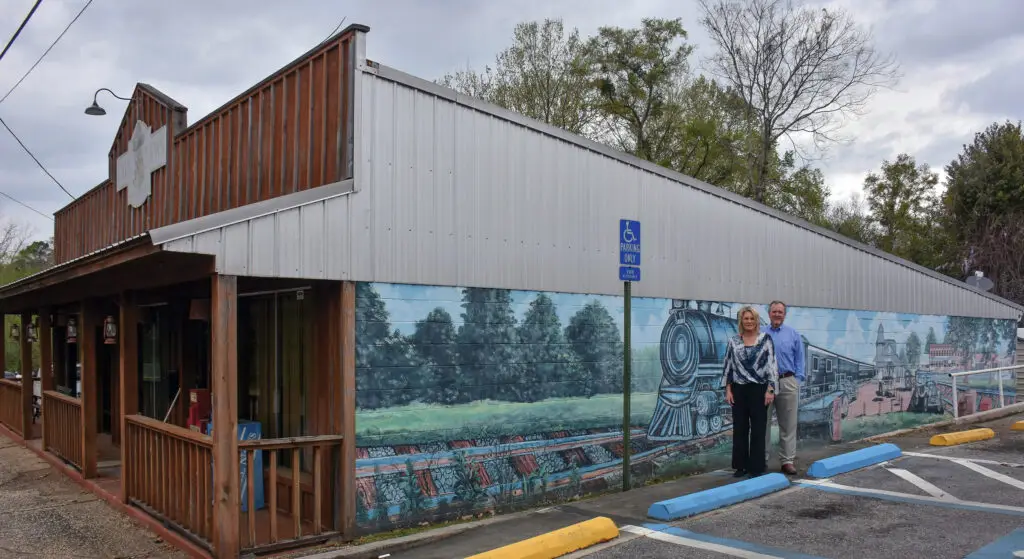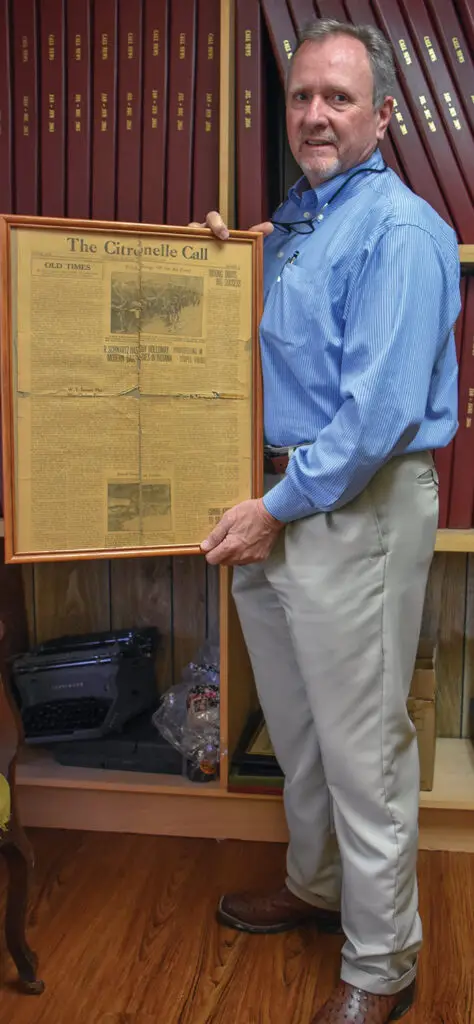By Emmett Burnett

February 26, 2023 was a turning point in Alabama journalism. Three of the states’ largest newspapers ceased to produce a printed version. Citing a plunging readership base, The Mobile Press-Register, Birmingham News, and Huntsville Times are no longer in ink.
But while the mighty have fallen, Alabama’s weekly newspapers still gather stories, roll the presses, and carry on, page by page on real, non-electronic paper.

“Now it is important to remember those three big newspapers did not go out of business,” says Alabama Press Association Executive Director Felicia Mason. “They just moved over to the internet. We still have strong daily newspapers such as the Montgomery Advertiser, the Dothan Eagle, Tuscaloosa News, and more.”
But, she adds, “Alabama has 109 print newspapers. Of that number, 82 are weekly. Their strength is local news content.” Mason also noted in a recent editorial that according to research firm Coda Ventures, 81 percent of Alabama’s adults rely on newspapers for local news and advertising.
The Elba Clipper, Coffee County’s go-to news source since 1897, is one such example. Owner-publisher Ferrin Cox describes the resiliency of his 126-year-old publication in a phrase shared by many in the weekly news business: “We print what they don’t.”
He speaks from experience. At age 85, Cox has owned The Clipper for 52 years.
“We cover the local beauty pageants, high school football games, civic clubs, churches, and news of Elba, and Coffee County,” he says. “We are there, at every Elba City Council Meeting.”
You won’t see the big news outlets at small town / city hall meetings unless the building is on fire.
Cox recalls the early days, when cut and paste did not involve a computer. One literally cut news type with a scalpel and “pasted it” on a copy board, until it was “camera ready.”
“Of course there were no digital cameras back then,” he recalls. “We had a darkroom for developing film. The darkroom was basically a little chemical plant that left you smelling like one.”
“We are a different animal. We do the back stories. We delve into the council meetings, the who, what, when, where, and why – not 5 minutes on TV and then it’s gone.”
New-hire journalists learn the weekly newspaper business on the fly. There are no specialists. Everybody – which can be over a dozen or less than 6 – specializes in everything.
“Our staff is cross-trained,” notes The Clay Times-Journal Editor-Publisher David Proctor. “Each person wears many hats. That’s how we survive.”
The roots of The Clay Times-Journal, based in Linville, date back to the 1800s. Charles Lester Proctor owned the paper until his death in 1992. His son David, who worked at his dad’s business for years, became editor -publisher.
“The key to success in this business is know your market,” he explains. “Clay County is largely rural and farming communities. We cater to it.” But there is more.
David Proctor strongly advocates “boots on the ground” type journalism. “At the Times-Journal, we believe if you are interested in your county, you are interested in what is going on in it. We have a warm body at every meeting – city council, school board, county commission, water and sewer board – everything.”
He acknowledges, “With a small staff it is not always easy to be at every municipal / city meeting, but we must be. They are spending our money. We need to be there and report it.”
Proctor does not speculate in detail why larger papers or online sites do not cover small towns, but suspects it is because of staffing. “I think perhaps they do not have enough people to cover small areas like ours,” he says, “But we do.”
With last February’s print closure of “The Big Three,” John Few, editor of The Madison Record and Madison County Record, found himself no longer in the shadow of The Huntsville Times. Actually, he never was.
“We are a different animal,” Few says, explaining that comparing big daily papers and online sites to weekly paper counterparts is like equating apples to oranges. “We do the back stories. We delve into the council meetings, the who, what, when, where, and why – not 5 minutes on TV and then it’s gone,” he says.
He adamantly believes small newspapers give local people a voice, a place to be, and a sense of community: “When somebody walks in our office, holding a prize giant turnip, we run a picture of it.”
Few also notes there is no better training for young journalists than a weekly newspaper, the smaller the better. “You not only learn every aspect of the news business, you do it.”
Just down the road from Madison, about 300 miles south, is The Call News, based in Citronelle since 1897. Its sister paper, The Washington County News, is 5 years older. Both are owned and published by Willie and Rhonda Gray.

With the Mobile Press-Register no longer a print product, The Call News is Mobile County’s only broadsheet (traditional newspaper page size) news publication. “We never considered the Press-Register as competitors,” says Gray. “They play their game and we do our thing.”
Whatever ‘thing’ The Call News does, it does it well. Dozens of Alabama Press Association awards, ranging from Best News Story, Best Sports Coverage, Best Human Interest Column, and other editorial and advertising awards, adorn the walls.
The Call News believes a personal approach is the key to success in weekly newspapers. “In small papers covering small towns, there’s a good chance you know the people in the story,” adds Rhonda Gray. “Our readers know us, too. We attend church together, our children are on the same Little League teams; in many cases, we are neighbors.”
She continues, “We do not do sensational journalism, but instead, print the facts from the source. Politicians and government officials are held accountable but we are not out to sink them.”
The Grays believe print journalism will always have a place. “Print is more legitimate,” says Gray. “Anybody can produce something online and change the story in minutes. But once your byline is written in ink on paper, it is there forever.” Knowing your byline is eternally stamped on paper motivates writers to strive for accuracy.
The co-publishers also note that a printed news story is often a keepsake. “Nobody has clippings from an Al.com screen shot,” says Gray. “But Call News’ clippings are on businesses’ walls, and in wedding albums, and scrapbooks, all over the place.”
Though weekly papers are holding steady, there are challenges. All interviewed agreed that the internet is now and will continue to change print journalism. Most weekly papers have online companion sites supplementing print versions.
“Our newspapers are doing a great job expanding platforms to reach a wider slice of their communities,” Felicia Mason adds. “We have a solid base of older people who like print and ink. But on the other side, young people are raised on iPads.” But she notes that younger readers live in a digital world and for many, that’s how they want news delivered.
“All of our newspapers are developing different news platforms, websites, social media, and electronic editions, to reach younger people,” she notes. “However, print will be around for a while. It is still viable in our communities throughout the state.”
The Clay Times-Journal’s David Proctor perhaps spoke for all: “Regardless of the platform, there will always be a need for journalism. Someone has to attend the meetings, conduct interviews, and collect data, in a fair and truthful way.
“Print or digital, we work to uphold the U.S. Constitution’s First Amendment. If you don’t have that, you have nothing.”ν




